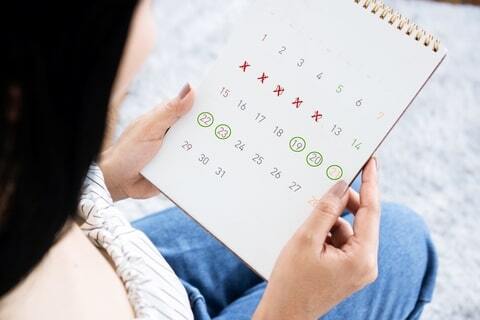
- Trending Categories
 Data Structure
Data Structure Networking
Networking RDBMS
RDBMS Operating System
Operating System Java
Java MS Excel
MS Excel iOS
iOS HTML
HTML CSS
CSS Android
Android Python
Python C Programming
C Programming C++
C++ C#
C# MongoDB
MongoDB MySQL
MySQL Javascript
Javascript PHP
PHPPhysics
Chemistry
Biology
Mathematics
English
Economics
Psychology
Social Studies
Fashion Studies
Legal Studies
- Selected Reading
- UPSC IAS Exams Notes
- Developer's Best Practices
- Questions and Answers
- Effective Resume Writing
- HR Interview Questions
- Computer Glossary
- Who is Who
The Link Between Weight and Menstrual Cycles
Your height and physique structure are influenced by genetics. They also determine our cyclicity initially. The menstrual cycle, however, will shift in response to alterations in age as well as weight, just like weight changes owing to external variables.
The main factors affecting your cycle are age and Obesity. The blueprint for cyclicity that is encoded in our genes will be altered. The length and speed of each phase in our lives (adolescence, adulthood, and menopause) are governed by our genetic schedule, yet every stage can be altered, prolonged, or cut short by our lifestyle choices.
Another way to think of our DNA is as a framework into which our daily activities make dings. Our menstrual experiences are shaped by the two on a weekly, monthly, and annual basis.

Menstrual Cycle: The Serious Aspects
Biology, in this case, is straightforward: Estrone is a weak form of estrogen that may be produced from basic cholesterol molecules in fat cells. Little estrone-producing factories in obese or overweight women's excess fat cells have an estrogenic influence on glands. Bleeding or menstruation problems may result from this much estrogen. For instance, even if a woman goes months without ovulating, the uterine lining continues to build up to the point of instability.
A woman may gradually have extended or extremely copious bleeding during her period, letting loose like a sluice gate. Women who are not overweight might also experience issues with their menstruation. It's also possible that women who are underweight or who have anorexia and bulimia like anorexia nervosa, which cause dramatic weight loss, inadvertently affect their menstrual cycles. Fewer periods or longer intervals between ovulation may occur in women with less body fat. Excessive exercise, stress, and starvation all have the potential to inhibit the hypothalamus. These women's bodies may cease producing estrogen because they are so underweight. A shortage of fat also prevents cells from converting cholesterol into excess estrogen.
Estrogen’s Impacts
The pituitary and hypothalamus provide signals that cause a woman's ovaries to release the female sex chemicals progesterone and estrogen. The endometrium, a cushiony uterine lining, is built with estrogen to support a fertilized egg. Menstruation, often known as having a period or menstruation, is the process by which a woman's body spontaneously eliminates that lining if fertilization is unsuccessful. Although every female's menstrual period is slightly different, most women's periods eventually fall around 22 to 36 days.
Does Menstruation Contribute To Weight Gain?
A female's menstrual cycle can be altered by weight loss or gains; however, might the opposite also occur? On the measure, it frequently looks as if that period in the month causes a slight increase in body weight. Weight fluctuations are not brought on by the menstrual cycle; it is an incidental contributor. There may be indirect links between the menstrual cycle and weight growth or decrease; however, this isn't the case.
Changes in hunger and food desire are among the premenstrual syndrome (PMS) symptoms, which can impact weight. According to research, women are more likely to seek meals heavy in carbohydrates and fats during particular periods of the menstrual period. They also prefer to consume greater amounts of calories during these times.
Some women report feeling heavy after experiencing bloating, another unpleasant but transient PMS sensation. It's better to limit your sodium intake and consume a well-rounded, nutritious diet of vegetables and fruits before, though, and after menstruation since salty foods can make the body retain water, which can appear on the weighing scale as a transiently increased weight. Also, frequent consumption of water can make you feel less bloated.
Your menstrual period continues to maintain a fine balance, so it's essential that you understand that substantial weight gain, as well as vigorous exercise and weight loss, can affect your body's ability to produce oestrogen and the way your hypothalamus works, which could affect how frequently and how long you get your periods.
How is Your Period Affected By Your Weight?
Your menstrual cycle may change whether you're underweight or overweight. Your ovaries and brain cooperate intricately to produce the menstruation periods.
Ovulation is brought on by changes in the amounts of a few hormones, and further hormonal changes bring on your menstruation. Your body can cease ovulating if something prevents this contact. You will miss a period if you don't conceive.
Your body weight and the percentage of body fat impact your hormone levels. You might miss menstruation if you are underweight and have insufficient body fat. Missed or excessive periods are another side effect of having too much fat. Sudden weight changes may also hamper your menstrual cycle. Getting to a healthy body weight will start your monthly period again if you are underweight or extremely overweight and not menstruating.
Consequences of Gaining Weight
Your menstrual cycle might be affected by weight gain in a variety of different manners. You can notice a difference in your menstrual cycle if you were commencing off with a healthy weight and weight increase causes you to enter the overweight or obese groups. Putting on weight may help your periods function normally when you're underweight and not receiving your period.
Excessive weight gain during menstruation is the cause of oligomenorrhea, dysfunctional and uncontrolled uterine bleeding, and significant blood loss during periods.
Impact of Weight Loss
Losing weight might make your menstruation shorter and more regular if you are an obese or overweight woman who experiences inconsistent periods or excessive menstrual blood. Yet it's also bad to lose too much body weight.
You might not get your period if you're underweight. Athletic people and female athletes with dietary issues frequently experience this. For women to menstruate frequently, their body fat percentage must be at least 22%. Your menstruation may change if your BMI is 18.5 or less.
Similar to weight gain, when beginning at normal body weight, there is not a particular amount of weight reduction that causes irregular periods.
Excessive and rapid weight loss during menstruation is the cause of both irregular periods and amenorrhea.
Consuming Too Much Caffeine
Due to how exhausted you feel during your period, consuming a lot of caffeinated drinks might be quite tempting. Adding extra caffeine to your meals might cause gastrointestinal side effects, including bloating and pain. Yet, other factors also play a role. Caffeine is a stimulant, and carbonated beverages are very potent stimulants.
Oftentimes, some women make the error of believing that fizzy drinks hydrate them. However, it's different than the situation, particularly given that soft drinks sometimes also include a significant quantity of additional artificial sweeteners and sugar, which seem much more harmful to bloating.
Conclusion
Your menstrual cycle may change whether you put on or lose weight, and this change might be for the better or worse. For instance, gaining or losing weight might cause your menstruation to decrease or cease completely, or it could make them regular. It is based not just on where you began but also on how much you gain or lose weight.
The usual length of a menstrual cycle is 28 days. However, they can extend up to 38 days. With an average duration of five days, typical menstruation lasts around two to seven days. Your chances of having irregular menstrual cycles increase if you are overweight or underweight.
Although it cannot be prevented, it is possible to reduce weight gain during periods brought on by hormonal changes.
It's essential to consult a doctor if you're gaining weight quickly or consistently since they can evaluate whether any other problems affect your weight than your menstruation. If your PMS symptoms seem like they're starting to affect your life, consider getting medical help.

